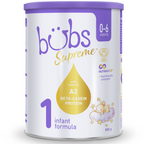Vitamin C For Children
At Bubs, we know just how important it is that your little one receives the right nutrients to support their growth and development. A variety of vitamins and minerals play an essential role in helping little bodies grow and develop, including vitamin C.
Why is vitamin C important, and how does it support your bub’s body?
Also known as ascorbic acid, vitamin C is a vitamin that helps to support a variety of essential processes carried out by the human body. One of the best-known ways it supports the body is by helping to fight infection and support the immune system. Vitamin C can also aid in the absorption of iron, especially from plant-based sources, and in the production of collagen, which strengthens bones, skin, and blood vessels and assists in wound healing. In addition, vitamin C is an antioxidant, which may also help to reduce the damage caused to cells by free radicals. Last but certainly not least, vitamin C also plays a part in the production of some neurotransmitters, which help send signals throughout the nervous system.(1)
What is the recommended vitamin C dosage for a child
The recommended daily intake of vitamin C for children does vary depending on age, with older children typically requiring more of the vitamin than younger children.
Australia’s National Health and Medical Research Council recommend the following daily dietary intake of vitamin C per age group:
- 1 to 3 years - 35 mg/day
- 4 to 8 years - 35 mg/day
- 9 to 13 years - 40 mg/day(2)
Although it is rarer today than it was in the past, a deficiency in vitamin C can lead to a condition known as scurvy. Symptoms vary from person to person, but the condition generally responds well to treatment. If your doctor suspects that your child may have a vitamin C deficiency, they may recommend a blood test to check their vitamin C levels or a children’s vitamin C supplement.
How can you introduce vitamin C to your little one’s diet?
There are many benefits of vitamin C for children and adults alike. However, unlike some other vitamins and minerals, the body cannot store or produce vitamin C. This means that we need to include foods rich in vitamin C in our diet. Vitamin C can be found in a wide variety of foods, including fruits and vegetables. Some common foods containing vitamin C include:
- Oranges
- Grapefruit
- Mandarins
- Strawberries
- Guava
- Tomatoes
- Broccoli
- Capsicum
- Kiwifruit
- Brussels sprouts
- Rockmelon
- Kale
- Cabbage (3,4,5)
It’s also worth noting that the way that foods containing vitamin C are prepared can affect the potency of the vitamin. For example, boiled or steamed foods tend to contain less vitamin C when compared to their raw counterparts, meaning that preparing a salad or lightly cooking vegetables can be a better option when serving foods rich in vitamin C to kids.(6)
Vitamin C is a water-soluble vitamin, meaning that if your child consumes more vitamin C than their body needs on any particular day, it will be excreted through their urine. It is important, however, that you carefully follow the dosage directions listed on any vitamin C supplements you may choose to give your child.
If you’re not sure whether your child is receiving an adequate amount of vitamin C within their diet, it’s best to speak to your doctor.
1 https://www.betterhealth.vic.gov.au/health/healthyliving/Vitamins-and-minerals#vitamin-c
2 https://www.nrv.gov.au/nutrients/vitamin-c
4 https://www.healthdirect.gov.au/vitamin-c
5 https://www.betterhealth.vic.gov.au/health/healthyliving/Vitamins-and-minerals#vitamin-c


